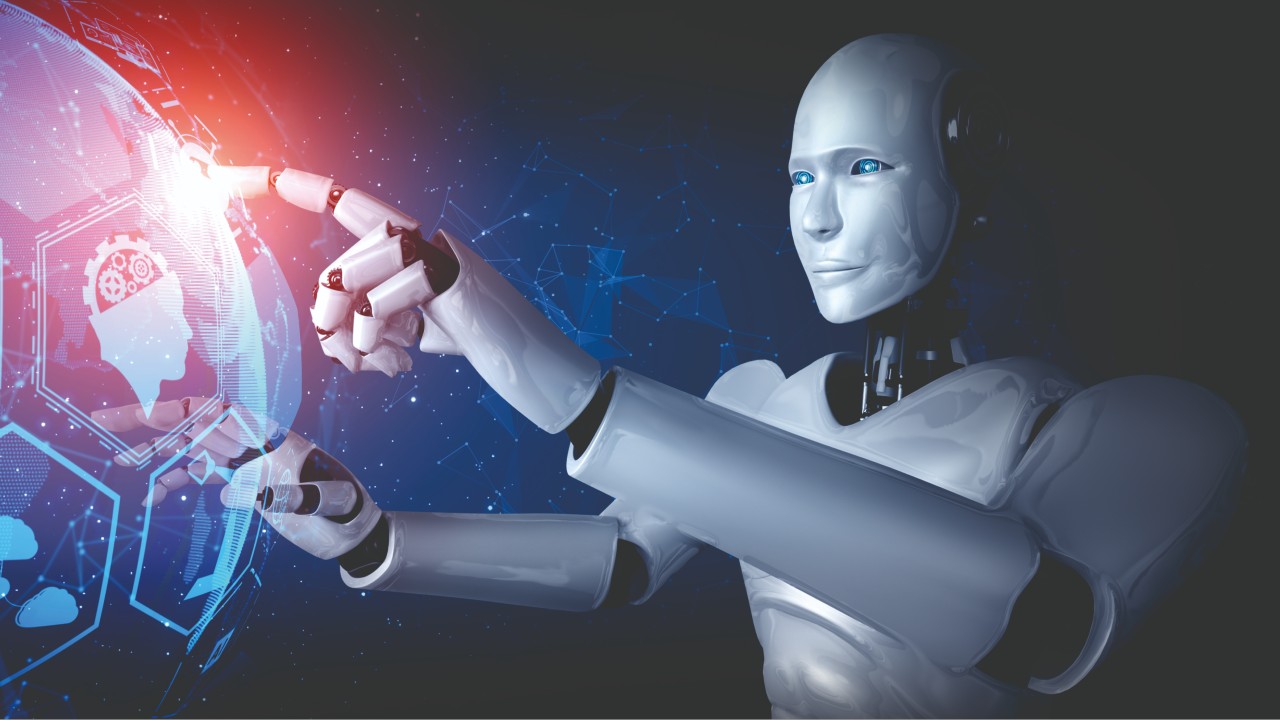With its advocates lauding benefits such as better client experiences and huge efficiency increases – and critics citing risks including job losses and data breaches, debate is raging about the impact of using artificial intelligence international moving and relocation business. Dominic Weaver speaks to some of those in the know about the transformative potential of this powerful emerging technology.
Although artificial intelligence (AI) has been around in some form for many years, the launch of ChatGPT in November last year finally appeared to make the prospect of its everyday use in business a reality. The move brought forward the AI plans of Meta, Microsoft, Chinese company Baidu, and other tech heavyweights, and triggered new discussions about the potential to supercharge sectors, including medicine, fight climate change, and dramatically accelerate the pace of technological progress overall.
AI technology has made notable inroads into moving and relocation already, with companies such as Yembo and Agoyu automating client survey processes using these tools, and the pandemic accelerating adoption by the industry’s larger players. Meanwhile, movers including United Van Lines, Atlas, JK Moving, and others have formed new tech partnerships to augment their service provision.
Michael Hughes, Vice President, Global Business Development, at Arpin International, and FIDI 39 Club board member, says: ‘RMC companies like SIRVA/ BGRS have also developed robotic process automation (RPA) tools to streamline data entry and reduce redundancies. These automatic “bots” take over menial tasks, eliminating human error and improving efficiency and accuracy.’
Meanwhile, tech-based firms in the relocation sector, including Equus, have used extensive data and programming resources to develop client-specific portals, such as Your Global
Mobility Advisor, created for IBM’s self-service app and allowing employees to manage budgets and logistics themselves.
These are just a few examples, with other applications including virtual assistants, intelligent chatbots, smart packing solutions, fraud detection, predictive analysis, route optimisation, anticipating demand for resource planning, and sentiment analysis. This already impressive – and by no means comprehensive – list is expected to evolve significantly and rapidly in the next few years.
Increasing trust
Raphaël Baptista, founder and CEO of online shipping services provider easygroupage, predicts AI will allow movers to give clients reliable commitments at the outset, in a way that they are already used to with online shipping.
‘We envision that AI will allow us to offer a contractual delivery date to a prospect moving from Paris to Sydney, for example, and honour it,’ he says. ‘For clients, having transparent information in real time increases the level of trust, reduces friction points and allows for better planning; why contact your mover continuously if you know for sure when your goods will be delivered?’
AI will also facilitate the delivery of more competitive and profitable pricing, Baptista says. ‘Automated yield management would allow our sector to have a better understanding of its margins and what jobs it should be focusing on winning.’
Nascent developments are also promising to bring significant operational benefits, he adds, with autonomous trucks helping to ‘solve the ongoing headache of recruiting drivers’, and further innovations helping plug gaps in sectors that have struggled to find the workforce.
In sectors and regions that do not suffer from a scarcity of employees, the subject of AI replacing jobs can be controversial. However, many people in the industry are optimistic that new technology – while it may impact on certain job roles – can create great opportunities for employees to upskill and focus on areas where their ‘humanness’ really provides the difference.
‘AI technologies can automate repetitive tasks, enhance productivity, and augment human capabilities,’ says Hughes. ‘This allows companies to allocate resources more efficiently and focus on higher-value work – ultimately driving innovation and growth.’
Addressing redundancy
Baptista says AI will increasingly allow movers to address ‘redundant workflows’ – routine jobs such as collecting customs documents, preparing documents, and booking trucks, containers or air cargo space – and enable staff to do more meaningful, rewarding work.
‘AI clearly has the potential to automate most of these time-consuming and low-value tasks. Move managers would have augmented capacities – with AI taking care of these redundant tasks, questions, documents and processes – and would be able to spend more time with clients, focusing on making their experience better.’
With enough data, Baptista adds, AI systems can help predict the probability of issues such as late arrivals, customs delays or breakages occurring during a move, giving move coordinators the tools to focus on highest-risk areas and preventing problems, rather than having to solve them.
AI can reduce the administrative burden for clients, too, pre-filling much of the information they need to provide as part of a move.
Carlos Ferri, founder and CEO of Shipeezi, says: ‘AI applications in moving and relocation are more of a solution than a threat to jobs. While AI may automate certain tasks, it also creates new roles and opportunities.’
With employees gaining new skills, they will work alongside AI systems, says Ferri, focusing on ‘higher- value activities that require creativity, problem-solving and personal interaction.’ So, yes, jobs will be made redundant, but they are highly likely to be replaced by related, but new, roles that now require AI know-how.
By reducing mundanity, optimising workflows and improving efficiency, AI can also make the sector more attractive to prospective employees, adds Ferri. Baptista adds that by ‘reducing the learning curve for new entrants to our industry, AI widens the pool for recruitment’.

The human touch
Some commentators complain that AI portents a dehumanisation of work – but Hughes reiterates that working alongside AI systems will shine a spotlight on the human side of moving, boosting clients’ experience and engagement in the process.
‘By leveraging AI and automating tasks, consultants and employees are freed up to focus on more meaningful interactions with transferees,’ he says. ‘This allows for higher levels of engagement through briefing calls and other touchpoint milestones, enabling personalised and attentive support throughout the moving process.
‘Ultimately, AI enhances the customer experience by optimising resource allocation and enabling dedicated human interaction at critical stages, leading to improved satisfaction and a smoother relocation journey.’
At Gosselin, European Services Manager Lennert de Jong says that AI systems for collecting and supplying clients with information may require DSPs to re-evaluate what services they provide and how; and that movers should embrace the opportunity to innovate with AI. However, he adds that some parts of moving will always need the human touch.
‘It is such a specific, personal experience having four or five people coming into your house and handling your stuff,’ he says. ‘This part is not going to be replaced by AI.’
Garbage in, garbage out
With continuing development of AI in the sector a given, mobility professionals need to consider the risks of implementing new technology in existing areas. ‘Introducing new technologies and processes can temporarily disrupt existing workflows and systems, requiring time and resources for employees to adapt and learn the AI solutions,’ says Hughes. ‘This can impact productivity and efficiency during the transitional phase.’
Hughes adds that AI systems require large amounts of good-quality data to support the quality and reliability of their outputs. If you put in biased, incomplete, or otherwise poor-quality information, this can easily produce inaccurate or biased outcomes. ‘This can have detrimental effects on decision-making and may result in unintended consequences or discrimination,’ he says.
With large amounts of often sensitive information in circulation, businesses need to ensure they are adhering to regulations and protecting the data used by their AI, Hughes says. Ethics are important, too, to ensure ‘fairness, transparency, and accountability’, and further prevent bias or inherent prejudice. However, with the right precautions in place to minimise the above, Baptista says the main risk is in ‘not implementing AI solutions and being distanced by your competitors’.
For Paul Bernardt, Managing Director of Harmony Network, the main obstacle for many movers will be cost. ‘The big question is, who is going to pay for AI development in an industry that lacks scale, ROI [return on investment], and capital?’ he asks. ‘We can all imagine a world where everything is automated, and the client can self-service their entire relocation from A to B using a smart, AI-driven portal – and the only human interaction is the packing crew and the home search counsellor. But, whoops, that portal doesn’t exist.’
‘Financial investment is a significant challenge, as implementing AI technologies often requires substantial upfront costs for infrastructure, software and talent acquisition,’ says Hughes. ‘It can be a barrier for organisations, especially smaller ones, to allocate the necessary resources to adopt AI.’
John Wu, Relocation Service Manager at AMR International Relocation, agrees: ‘Technology brings the advantages of efficiency and consistent quality, but the moving industry is still far away from full AI use because of the cost of configuration, customisation, development and maintenance.’
Hughes adds: ‘The rapidly evolving nature of AI presents a challenge in keeping up with the multitude of available programs and technologies. Staying updated and understanding the suitability of different AI solutions for specific use cases can be overwhelming for businesses.’
A lack of standardisation, the issue of integration with incumbent systems, and fostering customer understanding and trust of AI are further challenges. A significant skills gap will also need to be addressed; it is not only about taking on the new technology, but also about ensuring staff members understand how to manage it, which requires training.
While costs of new technology are falling and modular off-the-shelf solutions for the sector are increasing in number, some believe that the international character of international mobility makes it particularly challenging. For this reason, Bernardt believes it will be ‘a very long time’ before AI becomes the norm.
‘In our industry, no job is the same,’ he says. ‘We move people from different backgrounds, with different concerns, nationalities and family situations, from and to 180-plus countries, with changing customs and immigration laws. The people component will remain the most important factor for a very long time.’

Essential to compete
Nevertheless, in the next decade it will be essential for movers who want to remain competitive to adopt these new tools, says Hughes. ‘Integrating AI is crucial for operational efficiency, customer satisfaction, and keeping up with evolving market demands in the moving industry.’
While Ferri doesn’t consider AI technology mandatory for all movers – and that adopting it should be aligned carefully to an organisation’s specific resources, goals and long-term vision – he does believe it can provide them with a powerful advantage in the market.
‘As customer expectations evolve, integrating AI technologies can help companies stay ahead of the curve, deliver personalised experiences, and optimise operations,’ he says. ‘They can provide a competitive edge and foster long-term success in this evolving industry.’
Industry consultant and thinker Larry Kruger on why AI gains could be the moving business’s loss
My issue with AI is not about the process of transferring mundane information but rather sales and how this technology distances us from the customer. A consultative sale gives us the ability to identify a nuance from a customer and provide a customised solution. A solution that distinguishes you from the competition.
Counting chairs and estimating weight is a technical task, easily handled by AI. Developing a customised service, however, is a creative job, something both AI and inexperienced call centres are lacking.
My fear is two-fold, one we lose the wisdom in the industry, and two, we lose our hospitality mindset and with that our brand. We are seeing survey companies and RMCs posting weight for reverse auctions, resulting in mediocre service at best for the client and a race to the bottom for the mover. They are using technology to take the lump-sum market, with the natural evolution being the cash-on-demand market.
When we lose contact with the customer, we lose our ability to distinguish our service, we lose our ability to charge a fair price and with that we lose our brand. We lose our natural ability to use our knowledge and imagination to distinguish our organisations – and with that we risk becoming artificial ourselves.
Larry Kruger is an independent consultant at Customized Moving: https://customizedmoving.com/

